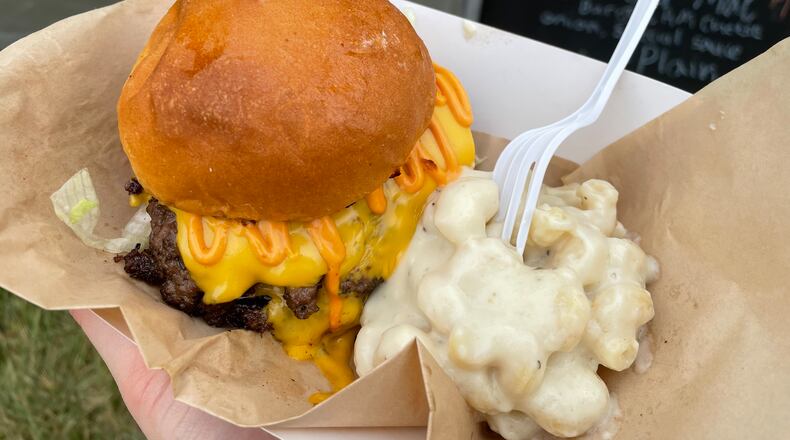But success as a food trucker involves hustling as much behind the scenes as when they are inside the trucks selling food and drinks to long lines at local festivals and events.
They have to be creative, both with what food they offer and the artwork on the outside of their trucks — usually, a food truck isn’t the only one at an event. Attracting the folks ready to spend their food dollars is key to a thriving business on wheels.
Austin Warman and Justin Hamilton own and operate The Food Pitt, a Dayton-region food truck serving smash burgers and homemade macaroni and cheese. They say it can take two days to prep for five days of events.
Credit: Natalie Jones
Credit: Natalie Jones
The business owners take extra steps of making their own pickles and slicing their own lettuce and tomatoes — raising the bar of what it means to have made-from-scratch food. They have partnered with Baker Benji’s in Dayton for smash burger buns, and have created their own special sauce.
“If you’re going to start a food truck, don’t come in thinking it’s easy,” Hamilton said. “Make sure you know it’s going to take a while for you to be big and make money. Be ready for your pockets to be empty for a little bit.”
Startup costs
Cory Thompson, president of the Dayton Food Truck Association who owns What The Taco?! and What the Dilla?!, said startup costs could range from $3,000 to $40,000 based on a food trucker’s budget and menu.
Total startup costs for Thompson in 2019 was around $2,000 with a tent, in addition to a $3,000 trailer that he bought after a few months of operating (this does not include the cost of food). His advice for those thinking about starting a food truck is you don’t have to buy everything brand new.
“If it didn’t work for me, I would have only lost $5,000 to $6,000, but there are people that go out and buy $40,000, $50,000 trailers (and) trucks. (Then it) doesn’t work and now they’re stuck,” Thompson said.
Credit: Natalie Jones
Credit: Natalie Jones
Damon and Catherine Roberts, owners of The Lumpia Queen, bought their first food trailer in August 2020 for $15,000, but once they got in it they realized they needed to make some updates and modifications to fit their needs.
They started off by making pancit in a pot on a flattop because that is what they had. Their food truck wasn’t equipped with burners.
“For what you do, you have to have the right equipment to do it,” Catherine Roberts said.
Total start up costs for The Lumpia Queen was around $20,000.
Credit: Tom Gilliam
Credit: Tom Gilliam
The owners of The Food Pitt started their food truck in August 2023. Warman had saved up about $15,000 — just enough to pay off his bills for a year and pursue the dream of opening a food truck. The brothers purchased the food truck in January 2023 for $7,000 and right away, the truck broke down. Warman has a background of working on cars, so they weren’t too worried about getting it up and running.
They spent the next several months polishing and sanding the outside to create a unique look and had help from family to piece together the inside. For example, they took two broken restaurant fridges and made it into one fully functioning fridge.
“There are a lot of people that can say they built their truck, but I don’t think there are a lot of people who could say they did it as hard as us,” Warman said.
Risks of owning a food truck
As a first-year food trucker, one of the hardest parts of operating is guessing how much food to prep for an event, Warman said. If someone tells them 300 people are expected to come to an event, then they assume about half that number will show up, and half of those people will eat.
“A food truck is the biggest risk ever,” Warman said. “You go out, you risk your truck breaking down, not only that, you risk things falling inside if you don’t have it set up right, but then beyond that you risk the amount of people that show up...how much business you will have.”
Credit: Natalie Jones
Credit: Natalie Jones
They also have to take into account if other food trucks will be at the event. Damon and Catherine Roberts said it’s important to ask if there will be free food anywhere, because that could impact the success.
Thompson said food truck owners can ask for minimums if they are unsure of what to expect at an event. For example, if Thompson asks for a minimum of $600 and makes $600, then the organizer would not have to pay him anything. If he only made $500, then the organizer would owe him $100.
Requesting minimums helps ensure your time, Thompson said.
On the other hand, to be at an event food truckers typically have to pay a fee. Fees can range from $75 to $3,000 depending on the size of the event and the location, Thompson said. When it comes to paying fees, it’s important for food truckers to ask what is included, Damon and Catherine Roberts said.
‘I love it when things don’t go right’
For What The Taco?! and The Lumpia Queen, they have both have had their fair share of tough times operating their food trucks.
“I love it when things don’t go right,” said Damon Roberts. “You hate it in the moment, but afterwards you’re like man it’s a good learning opportunity, what can we do to prevent it from happening again. We never, ever say we want to quit.”
Credit: Natalie Jones
Credit: Natalie Jones
Thompson recalled parking his food trailer full of food overnight because he had to be at an event early the next morning. He said someone unplugged his trailer and he lost $1,500 worth of food. The worst part — he didn’t have time to go get more food and prep it. He had to cancel, but said “I always try to make things right.”
The next week he took free food to the people who missed out.
The Lumpia Queen owners shared a recent incident where they ran out of propane. Luckily, a fellow food trucker had an extra tank. They said the food truck industry is all about relationships with other food truckers and local businesses to be successful.
Driven to succeed
One thing the food truck owners who spoke to the Dayton Daily News have in common is their hustle.
Thompson said he typically does five to seven jobs a week because he can’t say no. Many times he is set up some place for lunch and moves to a different location for dinner.
“Prepare to hustle,” Thompson said.
Credit: Natalie Jones
Credit: Natalie Jones
The owners of The Food Pitt knew what to expect when it came to how many hours they would be working because they were previously in the food industry. They have already worked about 80 jobs this year. It is not uncommon for them to work seven days nonstop when it takes two days to prep.
Damon Roberts is known for testing the boundaries with The Lumpia Queen. When they opened their first brick-and-mortar location at W. Social Tap & Table, their food truck was scheduled at the Celtic Festival.
“We wouldn’t be here today I don’t think if I didn’t keep testing the boundaries,” Damon Roberts said.
The Lumpia Queen was scheduled for the Asian Food Fest in Cincinnati one weekend and World A’Fair the next weekend. Luckily, they overestimated how many lumpia for Asian Food Fest, so they didn’t have to prep as hard for the next event.
“Rolling lumpia is a tedious job,” Catherine Roberts said.
Most people can roll 45 to 60 lumpia per hour. For Asian Food Fest, they prepared 5,000 lumpia.
Credit: Submitted Photo
Credit: Submitted Photo
From food truck to brick-and-mortar
The Lumpia Queen owners opened their first brick-and-mortar in 2022, followed by a second food truck and second brick-and-mortar location in 2023. The hardest part of transitioning from a food truck to brick-and-mortar was knowing how much food to prepare.
“When you go to a festival or you go somewhere you know the people are coming, but in a restaurant you don’t necessarily know,” Damon Roberts said. “You have the capacity now, but now you don’t know what to cook.”
With the brick-and-mortar store being at Wright-Patterson Air Force Base, they know lunch is 11 a.m. to 1 p.m. so they start preparing early to make sure they can get customers in and out. They take this same knowledge to W. Social, but in the food hall they also have online orders. Damon Roberts said they never know what to expect with those. His job is to make sure he schedules enough people to work.
Credit: Jim Noelker
Credit: Jim Noelker
How many food trucks are there?
In 2014, there were 181 mobile food licenses issued in Montgomery County, according to Public Health - Dayton & Montgomery County. In 2023, 296 licenses were issued. The number of food trucks in Montgomery County has grown by about 64 percent.
So far, 241 mobile food licenses have been issued in Montgomery County for 2024.
“Mobiles can wait to pay for their license, without penalty, before they operate for the year, so not all of the mobiles are licensed yet for this year,” said health department spokesman Dan Suffoletto.
Mobile licensing is dependent on the location of the mobile businesses’ headquarters, so this number doesn’t reflect how many food trucks operate in Dayton.
“If they do not have a business headquarters, then the location of their home is used,” Suffoletto said. “A mobile that is licensed by a health district in Ohio is allowed to operate anywhere in Ohio without having to pay any other health department fees. A mobile that has an out of Ohio license either needs to purchase a mobile food license (from the health district where they have their first event in Ohio) or purchase a temporary food license.”
Community support
When asked what keeps them going, the food truck owners said it is the love of doing it — and their customers.
“I will never be able to go back to a nine-to-five job for the simple fact that I’m my own boss,” Thompson said. “No one’s telling me today Cory you have to do this.”
Credit: Natalie Jones
Credit: Natalie Jones
With his food trucks, he listens to the people and wants to make them happy.
“For me, it’s the customers,” Catherine Roberts said. “Everywhere we go, they’re always so thankful for having us there. I think that’s what makes me want to keep going. I feel like we’re needed in a lot of these locations.”
The risks of owning a food truck is worth it, they say.
“You get to do what you want to do, what you love to do,” Warman said. “You can’t really do what you love to do unless you risk it sometimes.”
About the Author









